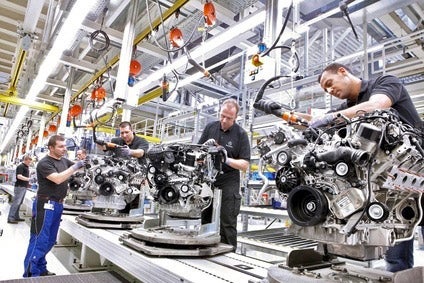
Daimler said on Wednesday (18 March) it had agreed with the Stuttgart-Untertürkheim works council to modernise the automaker’s original plant into a “centre of competence for production ranging from highly efficient engines to alternative drive systems offering “long-term job security”.
Manufacturing and supply chain management chief Markus Schäfer said: “The transformation plan is a groundbreaking achievement for the Untertürkheim plant and its employees. We are not only improving our flexibility and efficiency but also developing a plant with a tradition stretching back over 110 years into a high tech location for CO2 technologies.”

Discover B2B Marketing That Performs
Combine business intelligence and editorial excellence to reach engaged professionals across 36 leading media platforms.
Daimler said it would spend billions of euros billions over the next few years “for the realignment and modernisation of our production.”
Works council chairman Wolfgang Nieke said: “The agreement contains binding commitments regarding investment, additional production volumes and products, and the production of of fuel cell systems as a key technology of the future. 150 additional positions in vocational training [for five years starting from 2016] are a particularly good sign for us.”
The agreement will lead to cost savings in the range of hundreds of millions of euros until 2020, Daimler said.
Including its six sub-plants, the Mercedes-Benz factory at Untertürkheim on the eastern outskirts of Stuttgart has 18,700 employees and has been operating at high capacity utilisation for years.
Last year, the Cars unit set new records with over 1.75m vehicles produced and more than 1.72m sold. As part of its Mercedes-Benz 2020 growth strategy, the automaker is continuing to plan for significantly rising production volumes in the mid-term, offering stable employment at Untertürkheim as well.
Nieke added: “The agreement contains binding commitments regarding investment, additional production volumes and products, and the production of fuel cell systems as a key technology of the future. This has been one of our aims for years. The structure of the location will change, but the number of jobs will remain stable for many years and working conditions will be maintained.”
Untertürkheim plant will become a centre for highly efficient engines, hybrid powertrains and fuel cell system production. From 1 June, it will take on responsibility for a facility in Nabern in the greater Stuttgart area where assembly of the fuel cell system will take place. Nabern will remain the centre of overall development of fuel cell drive systems under the direction of Daimler.
“Alternative drive systems are an important element of our future mobility. Their share of automotive production is set to steadily rise over the next few years, complementing our highly efficient engines within the portfolio. This is what we have laid the groundwork for today,” said Schäfer.
In addition to introducing more battery electric models in the next few years, Daimler wants to bring to market competitive electric vehicles powered by fuel cells – sustainable mobility of the future.
The traditional production of engines, transmissions, axles and components at Untertürkheim will be comprehensively realigned and further capacities added. The focus is to keep in-house products with competitive relevance and to assign other tasks to suppliers. The foundry in Esslingen-Mettingen and the forge in Untertürkheim will remain integral parts of the plant.
Assembly capacities for engines will be significantly increased. The plant will add two new petrol engines and a new I4 diesel. The plant will focus exclusively on production of automatic transmissions for rear wheel drive vehicles while building up additional assembly lines over the next few years.
Mercedes-Benz Cars’ powertrain production network comprises several locations in Germany and other countries with Stuttgart-Untertürkheim at the hub.
The plant in Berlin focuses on the development and production of components and parts, as well as engine production. The plant in Hamburg develops and produces axles and axle components, steering columns and components for exhaust technology and lightweight structural components. The MDC Power engine factory in Kölleda, Germany, is a wholly-owned subsidiary of Daimler AG and produces I4 engines for Mercedes-Benz and Mercedes-AMG vehicles.
Further powertrain production capacities are located in other countries. This includes Romanian subsidiary Star Transmission which assembles transmissions and produces components as well as engine plants in Beijing, China (part of the Beijing Benz joint venture) and the Infiniti plant in Decherd, Tennessee (part of the strategic partnership between Daimler and the Renault/Nissan Alliance).
Location click here






